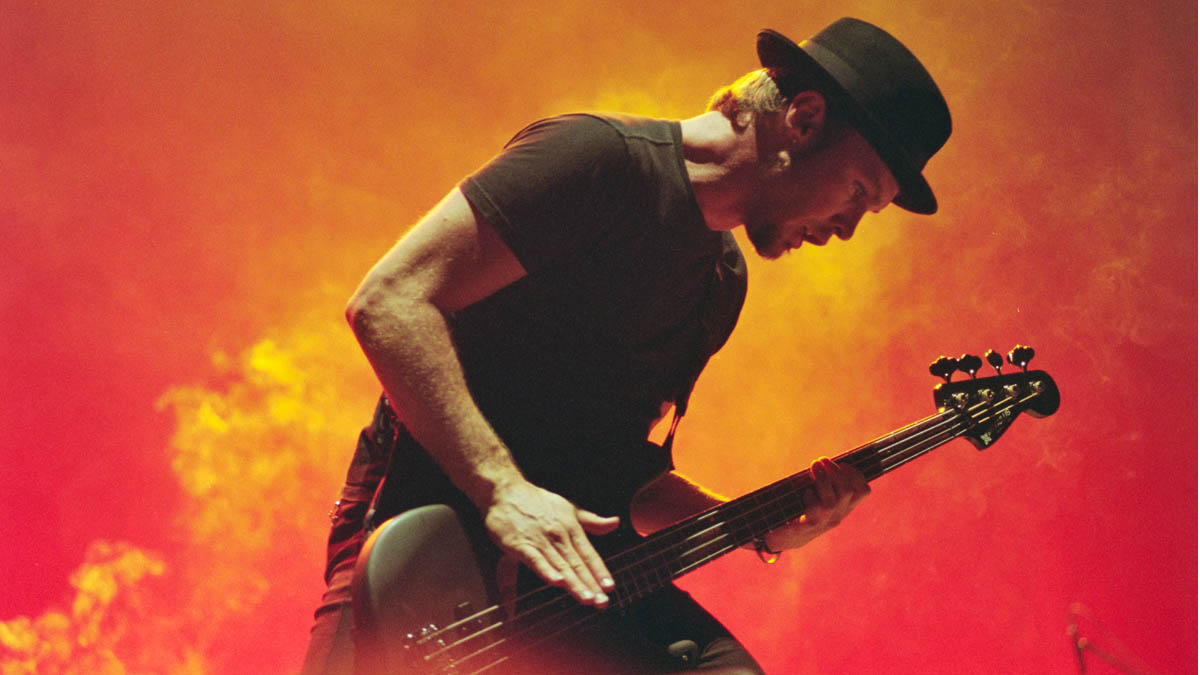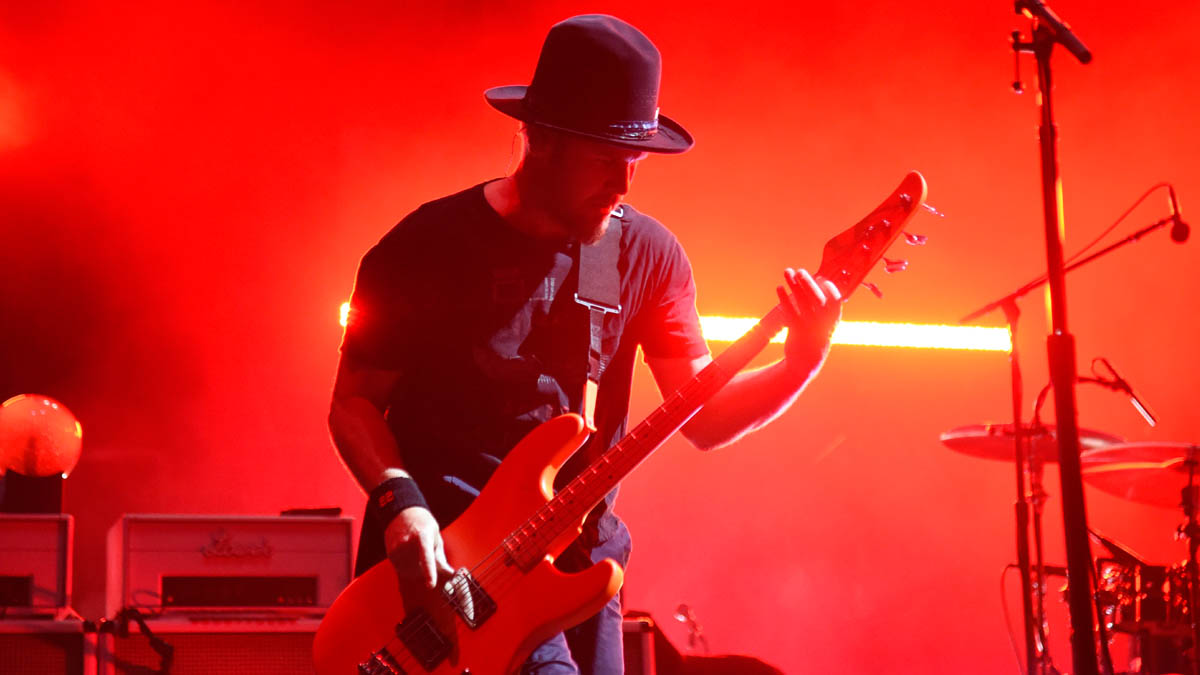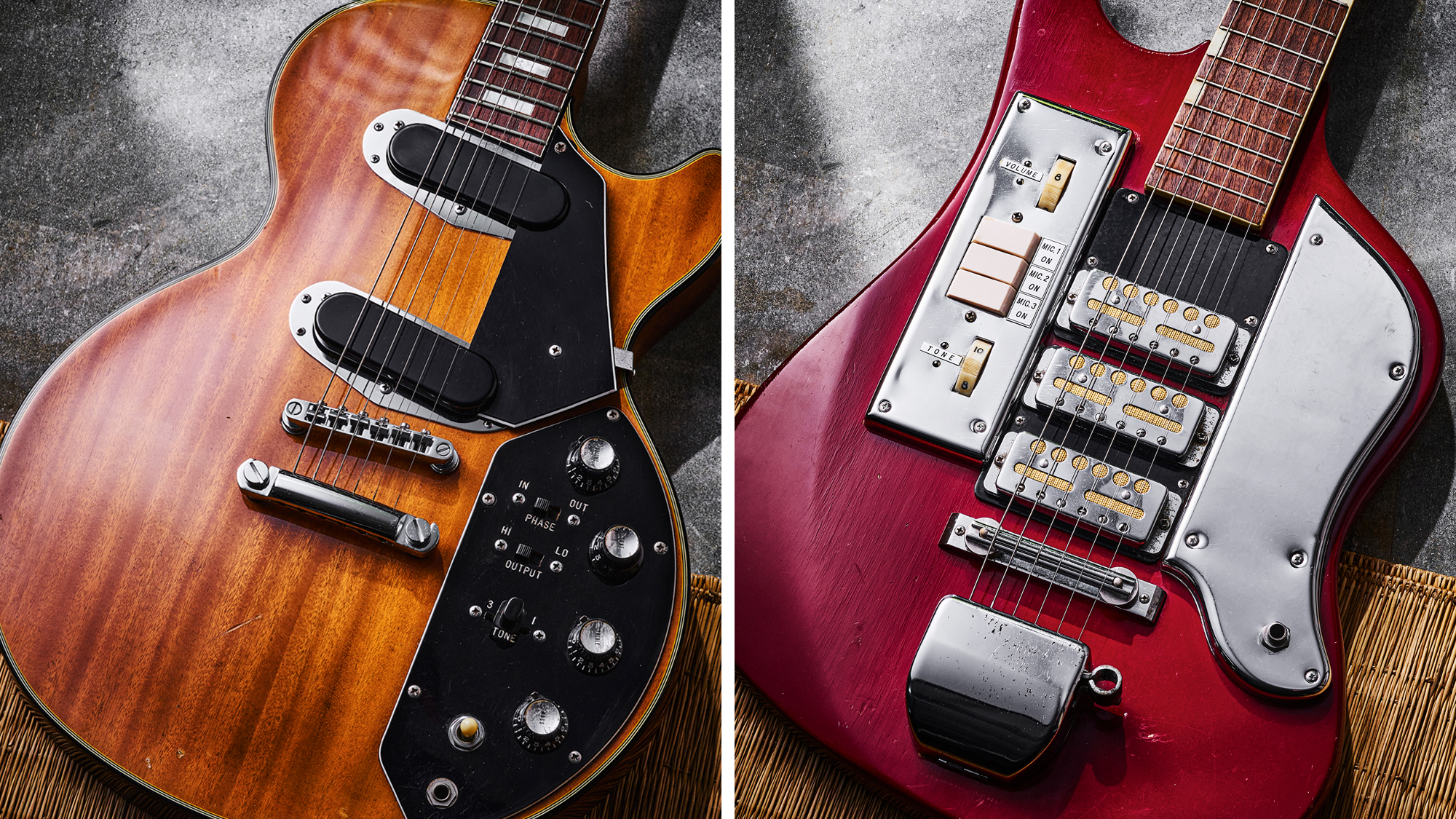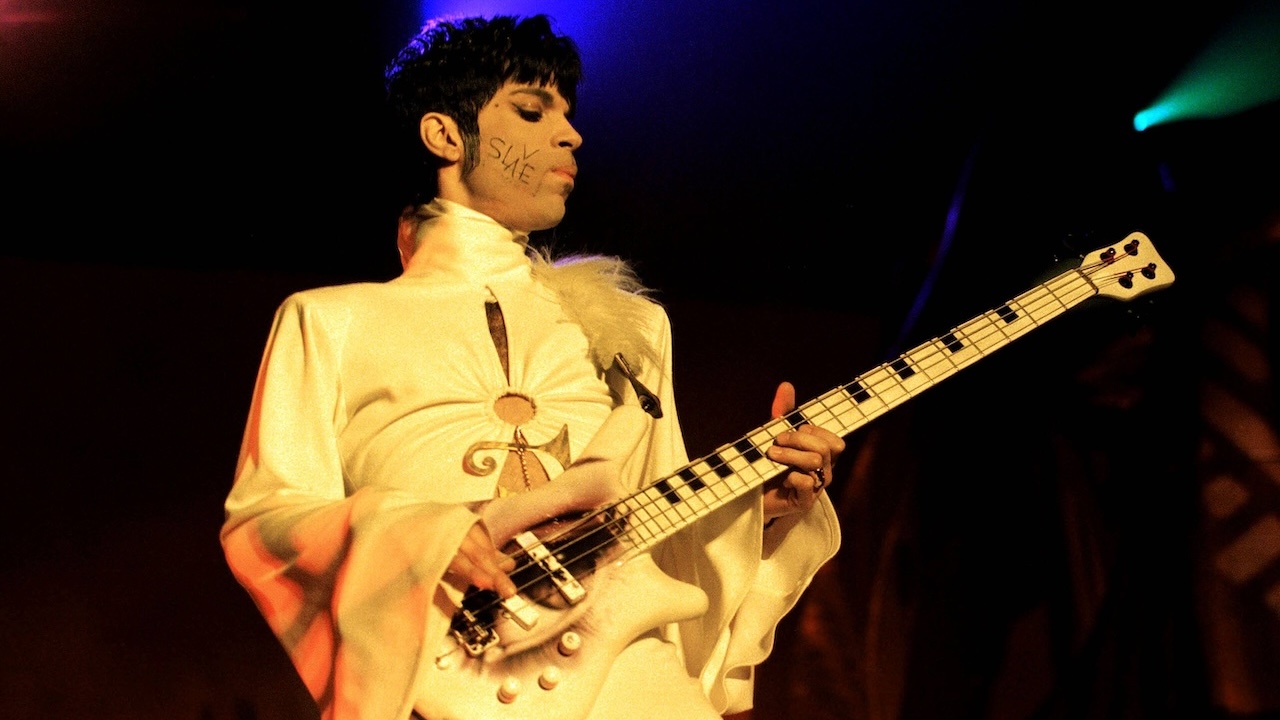Jeff Ament: “Stone was always writing from a Zeppelin angle, so seeing if fretless bass could work in that realm was exciting“
The Pearl Jam bassist looks back at the making of Ten, and details his new solo project, American Death Squad

As Pearl Jam bassist Jeff Ament awoke on New Year’s Day, 2020, he knew that in a few short months, his band would release Gigaton – their hotly-anticipated eleventh album, and the veteran rock quintet’s first clutch of new material since 2013.
Sprawling tours of North America and Europe would follow. For Jeff and his bandmates – vocalist Eddie Vedder, guitarists Stone Gossard and Mike McCready, and drummer Matt Cameron – this was shaping up to be their busiest and most important year in quite some time.
And yet on this warm July day, we find him relaxing with a cup of tea in the cosy confines of his Montana home, half a world away from the stages of Europe. The Pearl Jam tours, of course, are casualties of the current global pandemic.
“Montana’s where I grew up, and I typically come back here when I’m not touring,” he tells Bass Player. “I’m doing what I’d normally do. I go into the studio in the morning and then do some sort of activity in the afternoon, like go for a bike ride or a hike, or go skating.”
Recalling those chaotic days in early March, Pearl Jam were in the final push before their tour was to kick off in Toronto on March 18. As headlines grew progressively darker, the band faced some hard decisions.
“We’d spent about two-and-a-half weeks doing tour rehearsals,” Ament says, “and we were going to have a week off, mainly to get the gear to the East Coast.
Everybody was trying to find out what was going on, because we weren’t getting information from the epidemiologists at that point. We had three or four days of tough conversations.
Get The Pick Newsletter
All the latest guitar news, interviews, lessons, reviews, deals and more, direct to your inbox!
Going to Toronto and having fans from over 10 different countries show up at the first show didn’t seem like the right thing to do. We realized, ‘We’ve got to do this now, before people start travelling.’”
On March 9, the band announced that the tour would be postponed until 2021. Long-recognized for their activism and charity, Pearl Jam have kept 20 people on the tour payroll, even though there are no current live dates.
Meanwhile, in late March, Gigaton dropped as expected, to rhapsodic reviews from critics and fans, many rating it among their best. Friendly, engaging, and enormously laid back, Ament, 57, speaks with the easy candor of a man entirely comfortable in his own skin.
Over the years, he’s earned a reputation as one of the most creative and hard-working bassists of his generation. He’s played in several now-legendary bands, with Pearl Jam alone selling upwards of 100 million albums worldwide, snagging a Grammy and entering the Rock And Roll Hall Of Fame in 2017.
We realized, we’ve got to change things up. Just sitting around, waiting for the apocalypse to come knocking, isn’t a healthy lifestyle
Ament has also endured his fair share of setbacks along the way, and so, accepting that the chain of events lay far beyond his control, he wasted little time in pivoting.
“My wife and I got in the car and came out to Montana,” he says. “There was a lot of watching TV and listening to the radio, but after three or four days, we were just feeling worn out. We realized, we’ve got to change things up. Just sitting around, waiting for the apocalypse to come knocking, isn’t a healthy lifestyle.”
As he’s highly prolific and fortified by extra gym workouts in preparation for the tour, it was all but inevitable that Ament would make productive use of lockdown. “I had a ton of energy,” he says. “Finally I said, ‘I’m going to go in and try to write a song every day for a week’. That was my goal, and I mostly succeeded.”
Adding to his two-album solo catalog, Ament released American Death Squad on June 28, a five-track EP bristling with scathing political lyrics and a punchy rave-up of punk and classic rock.
“Two or three songs on the EP came from that first week,” he explains. “I think that, especially from a lyrical standpoint, there’s some good imagery. I approached almost every day by going into my studio first thing in the morning with a cup of tea, and I figured I’d just try to get something down.
“Some mornings I’d go in and write a super dirty thing, and then I’d be super pissed off and I’d write something uptempo. It’s amazing when you get that muscle going, how much fun and how much easier it is than if you just go in for two weeks. It truly took a pandemic for me to learn my writing craft!”

When he’s not flexing his songwriting chops, Ament can often be found patrolling the bowls and ramps of his local skate park. He has raised money for and been involved with over 20 skate parks, many on Native American reservations and in rural areas.
“I’m all about skate parks,” he says. “In fact, this afternoon, I’m heading out to one. Last year, we built one in Alberton, which is west of Missoula. There’s a little A-frame there, so we’ll socially distance a skating session. It’s an amazing time to be a skateboarder. There are so many skateparks that you can’t give it up at this point.”
In the 70s, the rising skate culture found a natural synergy with the punk movement, united by their outlaw status and a no-frills, DIY ethos. Coming from Big Sandy, a small Montana town, Ament found camaraderie and inspiration in the local skate scene – and ultimately, that set the stage for his journey into music.
John Deacon was such an awesome, funky bass player. I was probably listening to Queen and the Cult the most during Mother Love Bone
“I saw skateboarders starting their own bands,” he says, “and it gave me the confidence that you can really do anything. When I got into the punk rock world, I saw that a lot of these bands really were doing everything – they were making their own art, playing their instruments and recording the songs themselves. That was my entrance into being a bass player. Right off the bat, I was in a band. In fact, I think I was in a band before I actually played bass!”
Ament graduated high school in 1981 and entered the University of Montana as an art major, with aspirations of playing basketball and developing his bass chops. A chance meeting early into his freshman year would change his life forever.
“I was lucky enough to have a kid on my floor who was from California,” he explains. “His name was Jon Donohue and he had been in some hardcore bands there. We hit it off right off the bat. On the weekends, we’d just get together and play. We’d put on the Ramones’ [1979 live album] It’s Alive and play through all four sides – and within a month, I was playing songs.”
Fuelled by a consuming passion to master his instrument, Ament’s primary approach was self-learning. “It wasn’t like I could afford to go take lessons from anybody, and there certainly wasn’t anyone in Missoula who would’ve wanted to teach me punk rock riffs. I had a little musical background, though; I grew up playing piano and I was in the high school choir, so I was around music a little bit. That was really helpful.”
Ament immersed himself in the punk bands of the day, including the Sex Pistols, the Clash, the Dead Kennedys, and Black Flag, along with the UK’s 999. Into his rotation he added the Police, U2 and the Jam. “I really did learn how to play by just playing along with records,” he ponders.
I had a little musical background, though; I grew up playing piano and I was in the high school choir, so I was around music a little bit. That was really helpful
In 1983, Ament dropped out of university after the school canceled his graphic design program, and by the end of April, he had relocated to Seattle with $40 in his pocket and a steely-eyed focus on making it as a musician. He washed dishes, waited tables, and poured coffee to pay the bills, all the while building a network of local musicians – among them Mark Arm and Steve Turner, who invited him to join their band Green River.
As a sign of things to come, they also invited guitarist and future Pearl Jam co-founder Stone Gossard into the band, although Green River broke up six months before the release of their only LP, Rehab Doll, in 1987.
Committed to moving forward, Ament and Gossard formed Mother Love Bone in 1988 with the ferociously talented vocalist Andrew Wood. Their propulsive amalgam of arena rock and glam captivated both the scene and the major labels.
With MLB, Ament showcased a funkier and more aggressive style, explaining: “Andy was super into Queen, T. Rex, and Elton John, so a lot of it was listening to those records. We even learned a couple of Queen songs, like I’m In Love With My Car. John Deacon was such an awesome, funky bass player. I was probably listening to Queen and the Cult the most during Mother Love Bone.”
Ament began experimenting with both 12-string and fretless basses, laying down thick, propulsive lines that injected measures of swing into the mix. Although they were legitimate candidates for mainstream success, tragedy brought MLB’s dreams to a cruel halt when Wood died from an overdose only days before the release of their electrifying 1990 debut, Apple.
Once more, Ament and Gossard regrouped, this time forming the band that would launch them from the dark, sweaty clubs of Seattle into the soccer stadiums of the world. Pearl Jam’s groundbreaking 1991 debut album, Ten, struck halfway between the guitar-powered squall of Led Zeppelin, and the coal-eyed intensity of punk.
Hyper-addictive riffs and chest-pounding choruses sent tracks such as Alive, Jeremy and Even Flow into the charts, selling more than 13 million copies worldwide. Ten is an absolute feast for bass lovers, with Ament’s powerful and evocative basslines featuring prominently throughout.
Describing his approach to Ten, Ament says, “After Andy died and Stone and I decided to keep playing together, I thought ‘I need to get better. I need to change it up.’ So I thought, ‘I’m going to throw myself into the deep end on this and I’m going to learn how to play fretless bass.’ I think over half of that record is fretless. There’s a 12-string on three songs. Maybe Porch is fretted bass and I think everything else is fretless.”
Drawing from influences such as Tony Franklin, Mick Karn, David J, and Jah Wobble, Ament developed a fluid style that invested Pearl Jam’s classic rock stylings with deep, creamy tones, and thick elasticity.
“Stone was always writing from kind of a Zeppelin angle, so seeing if the fretless could work in that realm was exciting,” he says, and to this day, Ament remains a keen devotee of the fretless, adding, “Even on Gigaton, there’s fretless on a couple of songs, and with the writing that I’ve been doing in the past three months, I’m trying to use it more because I think it’s a very under-utilized instrument.”
Throughout Pearl Jam’s three decades, 11 full-length albums, and thousands of shows, Ament has carefully cultivated his role as both a bassist and a songwriter.
“My role has changed over the years. When we started out, it was two guitars. Stone was writing from a really right-handed, riff-heavy standpoint, and I was a little bit pushier at that point, in terms of wanting the bass to be prominent. For the songs I wrote, I played 12-string.
“Then by the time we were making Vitalogy in 1994, Ed was playing guitar more, so it just got a little trickier. There were three guitars, so depending on the song and how much I could play, the 12-string faded into the background a bit; with three guitars, there was already a lot happening on that frequency.
“My Father’s Son, which was on the last record, has a 12-string bass – with a heavy, riffy song, I always want to bust that thing out because it’s such a cool sound. It’s almost like having a piano out there with it.”
It’s incredible that we’re coming up on 30 years, but I would argue that making that last album was as fun of a record as we’ve ever made
As Pearl Jam’s collective songwriting process evolves, so does Ament’s approach – not only to his own songwriting, but to the varying styles of his bandmates.
“It’s changed a lot,” he says. “Everybody in the band writes, and everybody’s picking hands are really different in terms of how they play the guitar. That’s been one of the fun things – understanding every guy’s internal rhythm and adjusting my playing to that rhythm. It’s incredible that we’re coming up on 30 years, but I would argue that making that last album was as fun of a record as we’ve ever made.”
Ament’s current gear boasts the tried-and-true tools of the trade, along with some more exotic fare.
“For the last 15 or 20 years, I’ve been playing Mike Lull basses. The first fretless that’s all over that first Pearl Jam record, he built that bass for me. Mike started making basses for me back in ’91, and we probably built 10 or 12 basses together over the last 15 or so years.

• Read more: Top 4-string and 5-string bass guitars for all budgets
“I have a mid-60s P-Bass that has flatwounds on it that I use on tons of stuff; a Wal fretless; and a mid-60s Gibson EB3 for when you need something low and thuddy. Amp-wise, there’s a company called Analog Outfitters, who were making amps out of old organ parts. They’ve built me two or three amps, and that’s usually what I use in the studio, and I use one live, too.
“There are a couple of pedals I use, like the Tech 21 Dug Pinnick, which has a really incredible sound to it. I have a Swollen Pickle that has that crazy compressed fuzz, which is great.”
The young Jeff Ament set out to learn a few Ramones songs – and three decades later, he is one of the most versatile and respected musicians of his era. Beyond the awards, the platinum certifications and all of the fame and fortune that a budding rock star could ever want, perhaps his greatest achievement is just how unfazed he is by it all.
To him, there is only one way to measure success: “It’s asking yourself, ‘Are you getting a joyful feeling out of what you’re doing?’ For me, it can be writing a song, stumbling upon an idea, it could be warming up, or it could be making a mistake and that little mistake becoming a part of your repertoire.
“Mostly it’s just playing with a couple of guys and locking into something cool and creating something. The moment you hear that first note or word that really resonates with something inside of you... There’s nothing like it.”
“I asked him to get me four bass strings because I only had a $29 guitar from Sears”: Bootsy Collins is one of the all-time bass greats, but he started out on guitar. Here’s the sole reason why he switched
“I got that bass for $50 off this coke dealer. I don’t know what Jaco did to it, but he totally messed up the insides!” How Cro-Mags’ Harley Flanagan went from buying a Jaco Pastorius bass on the street to fronting one of hardcore’s most influential bands










